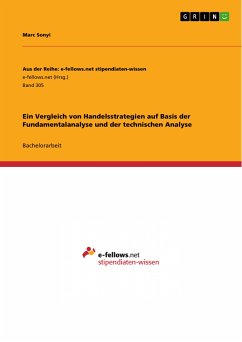
Fundamental Analysis, Behavioral Finance and Technical Analysis on the Stock Market (eBook, PDF)
Theoretical Concepts and Their Practical Synthesis Capabilities
Versandkostenfrei!
Sofort per Download lieferbar
Statt: 47,95 €**
36,99 €
inkl. MwSt. und vom Verlag festgesetzt.
**Preis der gedruckten Ausgabe (Broschiertes Buch)
Weitere Ausgaben:

PAYBACK Punkte
0 °P sammeln!
Diploma Thesis from the year 2008 in the subject Business economics - Investment and Finance, grade: 2,0, University of Applied Sciences Essen, language: English, abstract: Historically considered, fundamental and technical analyses have always competed, often leading to advocates that ideologically judge either a fundamental analysis or technical analysis to be the one and only analyzing concept. Behavioral finance is a relatively new scientific approach to explain psychological anomalies on the stock market, but is also more and more often considered to be able to compete with both fundament...
Diploma Thesis from the year 2008 in the subject Business economics - Investment and Finance, grade: 2,0, University of Applied Sciences Essen, language: English, abstract: Historically considered, fundamental and technical analyses have always competed, often leading to advocates that ideologically judge either a fundamental analysis or technical analysis to be the one and only analyzing concept. Behavioral finance is a relatively new scientific approach to explain psychological anomalies on the stock market, but is also more and more often considered to be able to compete with both fundamental and technical analyses. Still, do these analysis concepts really compete in practice or could they actually supplement each other with their respective strengths? Taking the turbulent stock market phases as well as these unanswered questions about fundamental analysis, behavioral finance and the technical analysis into consideration, this thesis ultimately pursues two general objectives: Firstly, fundamental analysis, behavioral finance and technical analysis should be scientifically examined in terms of their premises, analysis approaches, empirical evidences as well as strengths and weaknesses. Secondly, it should be examined as to whether the fundamental analysis, behavioral finance and technical analysis have theoretical and practical synthesis capabilities that could be used for developing a synthesis concept. The synthesis concept should combine the respective strengths and eliminate the respective weaknesses of each of the three analysis concepts. Fundamental analysis, behavioral finance and technical analysis are examined in detail. Empirical studies should prove if, and by which approaches, the analysis concept is able to predict future stock prices. In order to be able to develop a synthesis concept, each analysis concept is evaluated by a SWOT analysis, pursuing the objective of determining the respective strengths, weaknesses, opportunities and threats of the analysis concept being considered. Based on the previous SWOT analyses, the sixth chapter examines the synthesis capabilities of the fundamental analysis, behavioral finance and technical analysis. In a first step, the synthesis capabilities are theoretically analyzed. Based on the theoretical consideration the synthesis capabilities are also practically examined in a second step. A broad empirical study using the example of the DAX performance index analyzes the predictive capabilities of the three analysis concepts. By evaluating the theoretical as well as the practical synthesis capabilities, a general conclusion is drawn about the synthesis capabilities.
Dieser Download kann aus rechtlichen Gründen nur mit Rechnungsadresse in A, B, BG, CY, CZ, D, DK, EW, E, FIN, F, GR, HR, H, IRL, I, LT, L, LR, M, NL, PL, P, R, S, SLO, SK ausgeliefert werden.













